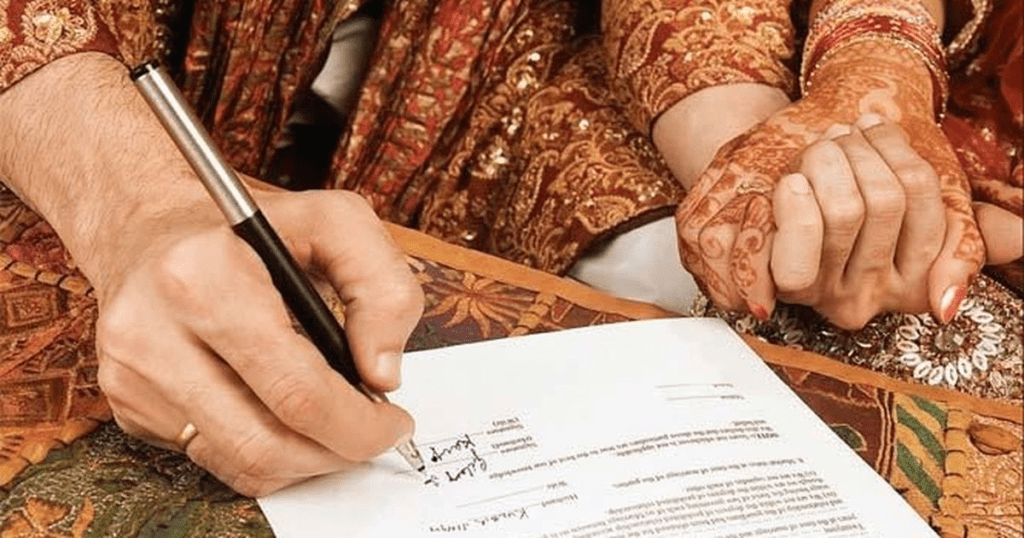
Do you know marriage registration is a crucial legal process that provides official recognition to a marital union under Indian law. It ensures legal validity, protects the rights of spouses, and serves as proof of marriage for various legal and social purposes. In India, marriages can be registered under two primary laws:
- The Hindu Marriage Act, 1955: Applicable to Hindus, Buddhists, Jains, and Sikhs.
- The Special Marriage Act, 1954: Applicable to interfaith and inter-caste marriages, as well as marriages between individuals of any religion or nationality.
So, this article provides a detailed overview of the process, eligibility, required documents, benefits, and challenges of marriage registration in India.
Introduction
Marriage is a beautiful milestone in life, but beyond the celebrations and rituals, there’s an important legal step many couples overlook marriage registration. While a wedding ceremony makes a marriage socially valid, registration gives it legal recognition. In India, the process varies depending on religion, but one thing is clear: registering your marriage is crucial for legal security, financial benefits, and future planning.
So, if you’re about to tie the knot (or already married but haven’t registered yet), this guide will walk you through why and how to register your marriage in India– without the legal jargon!
Why Is Marriage Registration Important?
You might be wondering, if I already had a religious or traditional wedding, why do I need to register my marriage? Here’s why:
✅ Legal Proof of Marriage
A marriage certificate serves as official proof of your marital status. This can be important in cases of property disputes, inheritance claims, and legal matters.
✅ Hassle-Free Documentation
Many official processes, like applying for a passport, visa, or changing your name require a marriage certificate.
✅ Financial & Social Security Benefits
Marriage registration helps in claiming insurance, pension, and spousal benefits in case of unforeseen circumstances.
✅ Protection Against Fraud & Bigamy
Registration helps prevent fraudulent marriages, bigamy, and child marriages, ensuring your rights are protected.
Which Marriage Law Applies to You?
In India, marriage registration is governed by different laws based on religion:
| Law | Who It Covers | Key Requirement |
| Hindu Marriage Act, 1955 | Hindus, Buddhists, Jains, Sikhs | Marriage should be solemnized as per rituals; registration is optional but recommended. |
| Special Marriage Act, 1954 | Interfaith, civil marriages | 30-day public notice required before registration. |
| Indian Christian Marriage Act, 1872 | Christians | Marriage should be conducted by a priest; registration follows. |
| Parsi Marriage & Divorce Act, 1936 | Parsis | Marriage must be registered with a priest. |
| Muslim Personal Law (Shariat), 1937 | Muslims | Nikah is considered a contract; registration is not mandatory but advisable. |
If you and your partner belong to different religions, or if you want a court marriage, you must register under the Special Marriage Act, 1954.
Step-by-Step Process for Marriage Registration
The process depends on whether you’re registering under the Hindu Marriage Act or the Special Marriage Act.
Under the Hindu Marriage Act (For Hindus, Buddhists, Jains, Sikhs)
✅Step 1: Visit your local Marriage Registrar’s office.
✅Step 2: Fill out the marriage registration form.
✅Step 3: Submit required documents (list below).
✅Step 4: Both partners and two witnesses must be present.
✅Step 5: Registrar verifies details, and you receive your marriage certificatewithin a few days.
Under the Special Marriage Act (For Interfaith or Court Marriages)
✅Step 1: Submit a Notice of Intended Marriage at the Registrar’s office.
✅Step 2: The notice is displayed publicly for 30 days.
✅Step 3: If no objections arise, the marriage is solemnized in front of a registrar.
✅Step 4: At least three witnesses must be present.
✅Step 5: Marriage certificate is issued.
Documents Required for Marriage Registration
No matter which law you register under, you’ll need:
✔Application form (signed by both spouses)
✔Proof of Age (Birth certificate, school certificate, passport)
✔Address Proof (Aadhaar card, voter ID, passport, utility bill)
✔Passport-size photos of both spouses
✔Marriage Invitation Card (if available)
✔Affidavit confirming marital status and nationality
✔Two Witnesses’ ID proofs
✔For Special Marriage Act: No Objection Certificate (NOC) after the 30-day notice period
Can You Register Your Marriage Online?
Yes! Many Indian states offer online marriage registration. You can:
1️⃣ Visit the official website of your state’s marriage registrar.
1️⃣ Fill out the form and upload necessary documents.
1️⃣ Schedule an appointment for document verification.
1️⃣ Visit the office for verification and collect your marriage certificate.
Common Challenges in Marriage Registration
Despite being a legal necessity, many couples face difficulties such as:
⚠ Lack of Awareness: Many people, especially in rural areas, don’t know that marriage registration is important.
⚠ Delays & Bureaucratic Hurdles: Lengthy paperwork and slow processes can cause frustration.
⚠ Interfaith Marriages Face Resistance: Couples registering under the Special Marriage Act sometimes face social or family objections.
To avoid these issues, plan early, ensure proper documentation, and follow up with the authorities regularly.
Recent Legal Developments in Marriage Registration
✔ Mandatory Registration: The Supreme Court has recommended making marriage registration compulsory for all couples.
✔ Digitalization: Many states have introduced online registration portals to make the process easier.
✔ Debate on Uniform Civil Code (UCC): The proposal for a Uniform Civil Codeaims to standardize marriage laws across religions in India.
Final Thoughts
Marriage registration might seem like a boring bureaucratic task, but it’s one of the most important legal steps after your wedding. It’s not just about paperwork—it’s about securing your future, protecting your rights, and making life smoother when it comes to legal and financial matters.
So, if you’re planning your big day (or already married but haven’t registered yet), don’t delay– get your marriage registered and enjoy the peace of mind that comes with it!
This Post is written by Shirsti
Disclaimer: The materials provided herein are intended solely for informational purposes. Accessing or using the site or the materials does not establish an attorney-client relationship. The information presented on this site is not to be construed as legal or professional advice, and it should not be relied upon for such purposes or used as a substitute for advice from a licensed attorney in your state. Additionally, the viewpoint presented by the author is personal.




0 Comments